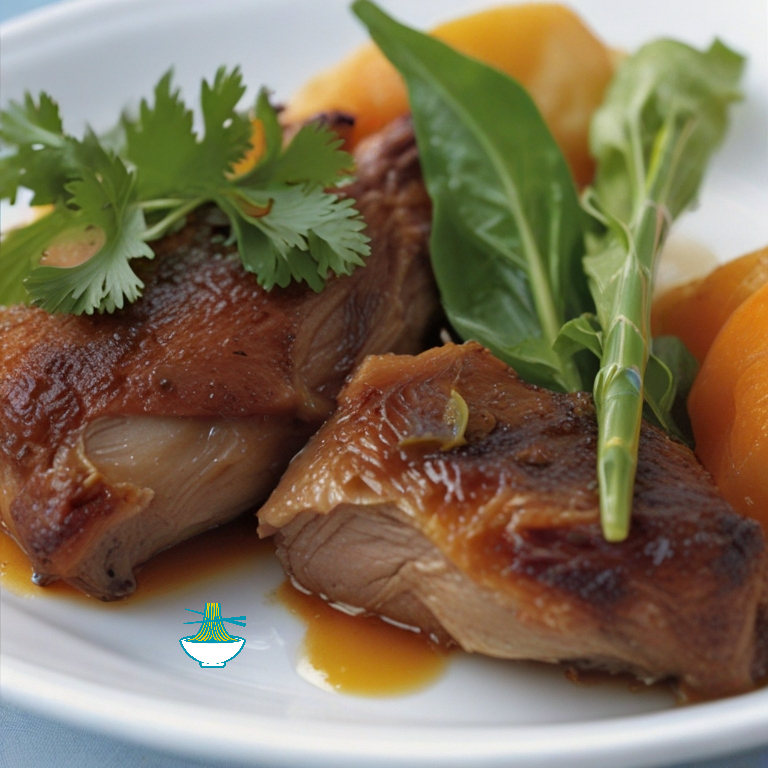Indulge in the timeless elegance of France's culinary heritage with our Confit de Canard. This cherished dish embodies centuries of gastronomic expertise, showcasing tender duck leg delicately preserved in its own succulent juices. Slow-cooked to perfection with aromatic herbs and spices, each bite unveils a symphony of flavors – from the crispy, golden skin to the melt-in-your-mouth, fork-tender meat beneath. Whether enjoyed as a centerpiece of a gourmet meal or a cozy evening indulgence, our Confit de Canard promises an unforgettable dining experience, transporting you to the heart of French culinary tradition with every delicious morsel.
Ingredients:
- 4 duck legs, preferably with thighs attached
- 1 kg duck fat (or substitute with a combination of duck fat and olive oil)
- 4 cloves of garlic, peeled and crushed
- 4 sprigs of thyme
- 2 bay leaves
- Coarse sea salt
- Freshly ground black pepper

Instructions:
1- Preheat Oven: Preheat your oven to 300°F (150°C).
2- Prepare Duck Legs: Pat the duck legs dry with paper towels and season generously with coarse sea salt and freshly ground black pepper on both sides.
3- Infuse Flavor: In a small saucepan, heat the duck fat over low heat until melted. Add the crushed garlic, thyme sprigs, and bay leaves to infuse the fat with flavor.
4- Cook Duck Legs: Place the seasoned duck legs in a deep ovenproof dish or Dutch oven, ensuring they fit snugly in a single layer. Pour the melted duck fat mixture over the duck legs until they are completely submerged.
5- Slow Cook: Transfer the dish or Dutch oven to the preheated oven and cook the duck legs, uncovered, for about 2 to 2 ½ hours, or until the meat is very tender and can easily be pulled away from the bone.
6- Crisp the Skin: Once the duck legs are cooked, increase the oven temperature to 400°F (200°C). Carefully remove the duck legs from the fat and place them on a baking tray lined with parchment paper, skin side up. Roast the duck legs in the hot oven for about 15-20 minutes or until the skin is golden brown and crispy.
7- Serve: Remove the duck legs from the oven and let them rest for a few minutes before serving. Optionally, you can serve the Confit de Canard with a side of sautéed potatoes, a green salad, or your choice of accompaniments.
8- Enjoy: Serve the Confit de Canard hot, savoring the tender, flavorful meat and crispy, golden skin.
9- Storage: Any leftover duck confit can be stored in an airtight container in the refrigerator for up to one week. To reheat, gently warm the duck legs in an oven or skillet until heated through.
This recipe yields beautifully tender and flavorful duck confit, perfect for a special occasion or a comforting French-inspired meal. Bon appétit!
Nutritional Values:
Duck Legs (per 100g):
- Calories: 250 kcal
- Protein: 16g
- Fat: 20g
- Carbohydrates: 0g
- Fiber: 0g
- Sugars: 0g
- Cholesterol: 85mg
- Sodium: 80mg
benefits
- Rich source of high-quality protein, essential for muscle repair and growth.
- Contains healthy fats, including omega-3 fatty acids, which support heart health.
- Provides essential vitamins and minerals such as iron, zinc, and selenium, important for various bodily functions including immune function and metabolism.
Duck Fat (per tablespoon, about 13g):
- Calories: 120 kcal
- Protein: 0g
- Fat: 13g
- Carbohydrates: 0g
- Fiber: 0g
- Sugars: 0g
- Cholesterol: 10mg
- Sodium: 0mg
benefits
- Adds rich flavor and depth to dishes.
- Contains monounsaturated and saturated fats which can provide a source of energy.
- Contains vitamin E, an antioxidant that helps protect cells from damage.
Garlic (per clove, about 3g):
- Calories: 4 kcal
- Protein: 0.2g
- Fat: 0g
- Carbohydrates: 1g
- Fiber: 0.1g
- Sugars: 0g
- Cholesterol: 0mg
- Sodium: 0mg
benefits
- Contains allicin, a compound with antimicrobial properties that may help fight infections and support immune health.
- Rich in antioxidants, which help protect cells from damage caused by free radicals.
- May have potential cardiovascular benefits, including lowering blood pressure and improving cholesterol levels.
These values are approximate and can vary depending on factors such as cooking methods and specific brands of ingredients used. Additionally, since much of the duck fat is rendered off during cooking and not consumed, the final nutritional values may differ slightly from these estimates.


Comments